30 Jul 2024 - {{hitsCtrl.values.hits}}
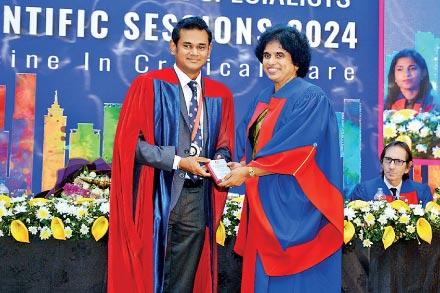
Dr. Dilshan Priyankara awarding an honorary fellowship to Dr. Shirani Hapuarachchi
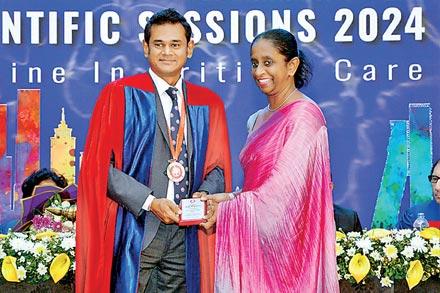
Prof. Anuja Abeydeera receiving an honorary fellowship
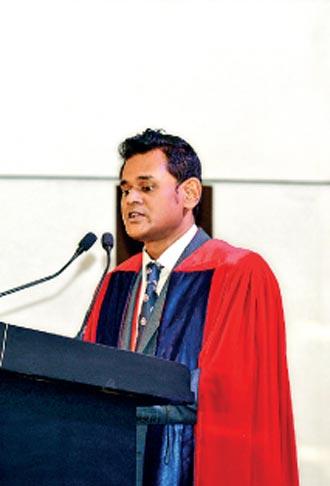
Dr. Dilshan Priyankara
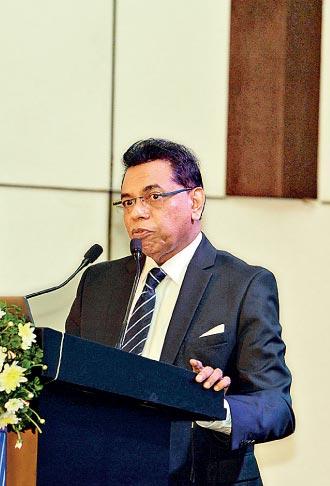
Dr. Palitha Mahipala
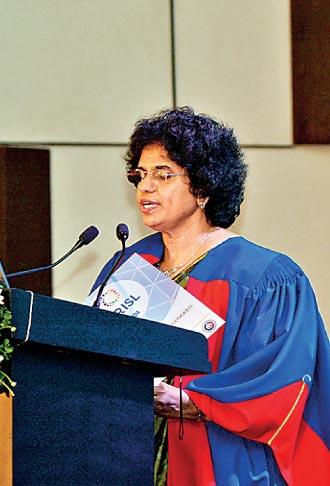
Dr. Shirani Hapuarachchi
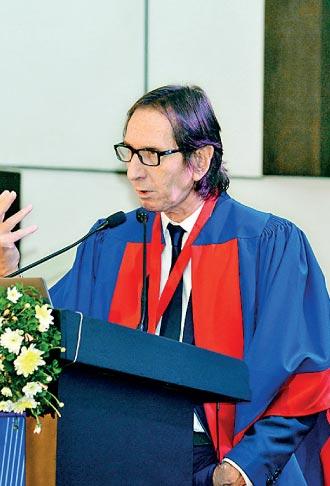
Prof. Teboul delivering the inaugural oration
The Ceylon College of Critical Care Specialists (4CS) recently held its inaugural scientific sessions on the theme ‘Precision medicine in critical care’, reflecting on the journey it has come thus far and the recent advances in this medical discipline. The role of critical care specialists including intensivists in Sri Lanka’s healthcare sector was acknowledged and appreciated at this event. The inaugural oration was delivered by Prof. Jean-Louis Teboul, Professor of Therapeutics and Critical Care, University of Paris-Saclay, France. Several distinguished invitees including Secretary, Ministry of Health Dr. Palitha Mahipala graced the occasion.
Precision medicine, the future of health
Reflecting on 4CS’ journey over the past few years, its President, Dr. Dilshan Priyankara said that from its humble beginnings they have overcome challenges, embraced opportunities and consistently evaluated their standards to meet the evolving needs of the profession and its patients. “Our journey has been marked by significant milestones; we have expanded our membership fostering a vibrant community of critical care specialists across Sri Lanka. Through continuous education and training initiatives, we have empowered our members with the latest knowledge and skills, ensuring that they remain at the forefront of medical practice.”
He further spoke about the strong partnerships they have made with healthcare institutions, government bodies and international organisations, amplifying their impact and advocating for advanced critical care medicine nationwide. “We have faced enormous challenges particularly with the Covid-19 pandemic. Today as we inaugurate this new chapter with the theme of ‘Precision Medicine’ we reaffirm our commitment, innovation and patient-centered care.”
Precision medicine plays a key role in the diagnosis, treatment and prevention of diseases while providing clear interventions to the unique characteristics of each individual. Dr. Priyankara further reiterated on the three eras of medicine. “The first era was intuitive medicine which took place in early the 1950s and early 1980s. In the era of intuitive medicine, practitioners were trained to identify common symptoms and prescribe a general therapy for recovery. However, this was done without understanding the disease and why it worked. Intuitive medicine was replaced by the era of evidence-based medicine. Science was fully integrated to treatments and therapies. Most importantly this era gave birth to randomised controlled trials. Imagine we need to check new therapies to treat a disease, evidence-based medicine tells us whether the new treatment works or not. If we take 50 subjects for a randomised controlled trial and 40 of them get better, in evidence-based medicine these results would be considered a success. But what about patients who didn’t get better? This is where precision medicine comes in. Precision medicine is evolutionary thinking, understanding of factors like family history, genetics, diet and lifestyle that affect each individual and culminate a specific disease.”
The promise of precision medicine is the ability to precisely diagnose an individual. “Ideally we would understand what biochemical or physiological process that cause the issues. With this knowledge we would be able to precisely match a therapy that we know will work. As practitioners and scholars in critical care embracing precision medicine focus on new avenues to deliver more personalised and effective treatments ultimately improving outcomes and quality of life of patients,” he continued.
Dr. Priyankara further said that the personalised medicine approach will enable healthcare professionals to distinguish patients who have similar clinical presentations but different cellular and molecular responses that will influence their response to specific treatments. “Hence, precision medicine is the future of health,” he said in conclusion.
Evolution of critical care medicine in Sri Lanka
The concept of critical care medicine arose in 1952 at the onset of the Copenhagen polio epidemic.
In her address, Senior Consultant Anesthetist Dr. Shirani Hapuarachchi said that critical care medicine is a speciality that looks after critically ill patients in intensive care units with machines to support, intense monitoring and close observation by one-to-one nursing care or even more than one nurse per patient, especially in paediatrics and cardiac care with an intensivist on the floor throughout. “The latter is a must as these critically ill patients can deteriorate very rapidly. Unless deterioration is detected swiftly, the cause identified and timely corrective measures taken, we might lose the patient. In Sri Lanka, the first intensivist was the late Dr. A. T. W. P Jayawardena, a gentle giant in the field of cardio-thoracic anasthesia who first started the surgical intensive care unit in the theatre complex of the then General Hospital, Colombo in 1968.”
Over time, critical care medicine was evolving as a distinct specialty in the developed world. She reflected on the advancements in the field of critical care medicine with study programmes and training opportunities provided for medical students who were interested in specialising in this field. Despite being a difficult terrain to navigate, Dr. Hapuarachchi appreciated the efforts of young specialists who are dedicated to their profession. In her speech she also reflected on infrastructure development at Intensive Care Units in several hospitals in Sri Lanka.
Govt.’s support to advancement of precision medicine
Reminiscing breakthroughs in the field of healthcare in the past, Health Ministry Secretary Dr. Palitha Mahipala said that the first medical college was established in Ceylon back in 1870. “The second maternity hospital for the whole of Asia was set up in 1789; Ceylon introduced the first Caesarean Section in Asian countries back in 1905. “In 1915 we started the first antenatal clinic for the entire Asia and in 1931 we started to deliver free healthcare services and free education.”
Speaking about precision medicine he said that this field is revolutionising how we approach healthcare by tailoring treatments to individual patients based on genetic, environmental and lifestyle factors. “In critical care time and accuracy is paramount and the potential benefits of precision medicine are profound. Precision medicine promises to enhance the effectiveness of treatment, reduce adverse effects and improve patient outcomes. By integrating advanced technologies and data analytics, we can better understand unique characteristics of each patient and customise care accordingly. Healthcare today is about new ideas, new approaches and new technologies.”
However, the implementation of precision medicine in critical care has its own challenges. Dr. Mahipala said that it requires substantial investment in technology, training for healthcare professionals and robust infrastructure for data management. “Despite these challenges the opportunities are immense. We are on the brink of a new era in healthcare where treatments are more targeted, effective and patient-centered. Critical care specialists play a pivotal role in this transformation. Their expertise and commitment to adopting new technologies and methodologies is crucial in integrating precision medicine into everyday clinical practice.”
He further said that the government is committed to support the advancement of precision medicine in Sri Lanka. “Innovations such as artificial intelligence, genomic sequencing and personalised therapies are within our reach and it is our collective responsibility to harness these advancements for the benefit of our patients in this country.
We are investing in healthcare infrastructure, promoting research and development and ensuring that our healthcare professionals have access to latest training and resources. Based on the requirement, the Health Ministry and the Government of Sri Lanka has started healthcare reforms. These reforms will ensure to build a responsive primary healthcare, ensure patient safety and we will invest Rs. 45 million to reach these objectives as intended,” he said in conclusion while congratulating the Ceylon College of Critical Care Specialists for their tremendous contributions to the field of critical care in Sri Lanka.
In his inaugural oration, Prof. Teboul delivered a comprehensive lecture on fluid responsiveness – the ability of the left ventricle to increase its stroke volume in response to fluid administration and lessons learnt over the past 25 years. Two honorary fellowships were awarded to Prof. Anuja Abeydeera and Dr. Shirani Hapuarachchi in recognition of their distinguished service to the profession and the College.
27 Dec 2024 1 hours ago
27 Dec 2024 2 hours ago
27 Dec 2024 3 hours ago
27 Dec 2024 3 hours ago
27 Dec 2024 3 hours ago